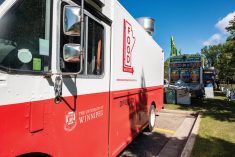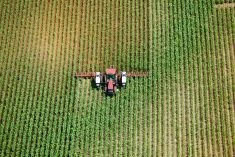Manufacturers are “an order of men whose interest is never exactly the same with that of the public.”
That quote is originally from the first economist, Scotland’s Adam Smith, almost 250 years ago, and is repurposed by writer Eric Schlosser in the foreword of Iowan Austin Frerick’s new book, “Barons: Money, Power, and the Corruption of America’s Food Industry.”
The phrase strikes true for farmers and ranchers, who have seen the most vital sectors of their food-producing business, like meatpacking, grain merchandising and seed technology, overtaken by today’s ever-growing, ever-grabbing examples of the phenomena.
Read Also

Trade uncertainty is back on the Canadian national menu
Even if CUSMA-compliant goods remain exempt from Trump’s new tariffs for now, trade risk for farmers has not disappeared, Sylvain Charlebois warns.
Full disclosure: Frerick is a valued colleague and friend, and the book includes a handful of references to previous Farm and Food File articles.
The author digs deeply into the rise of seven of these powerful, largely unknown baronial food families to tell how each came to dominate their respective sectors and how they now wield their accrued market power to make everything — from their neighbours to the environment to you — pay for it.
He begins with the compelling story of Jeff and Deb Hansen, two hog farmers you’ve likely never heard of. Both were Iowa farm kids who, after marriage, began a hog enterprise with three sows. Their drive, skill and innovations soon led them to expand, then expand again, then really expand.
Now their company, Iowa Select Farms, “employs more than 7,400 people … and brings about five million hogs to market annually,” writes Frerick.
Iowa Select became a cornerstone for the concentrated animal feeding operations (CAFOs) takeover of Iowa’s hog sector. Since 1992, Iowa’s CAFO-based hog population statewide has increased by over 50 per cent, while hog farm numbers have been slashed by over 80 per cent, the book notes.
That rise delivered the Hansens multiple homes and kingmaker status in Iowa’s ag biz-dominated state government.
Their home state, however, hasn’t fared as well. Pigs now outnumber Iowans seven to one and produce the “manure equivalent to the waste of nearly 84 million people,” or “more than the population of California Texas, and Illinois combined.”
Wait until you read about dairy barons Sue and Mike McCloskey, whose cows produce four million school cartons of milk each day and 430,000 gallons of manure.
Then there’s the “faceless” Reimann family of Germany, whose Luxembourg-based JAB Holdings is now the “world’s second largest purveyor of coffee” through brands like Peet’s, Caribou, Krispy Kreme, Panera Bread, and others too numerous to name. What is known, however, is that JAB entered the coffee-slinging business just 12 years ago and is now a global, if unknown, giant.
Other barons include the Cargill-McMillian family, the world’s most dominant grain merchandising company; “Berry Barons” J. Miles and Garland Reiter, who own Driscoll’s (through which they control “about one-third of the U.S. berry market” while not “actually growing any berries”; the Brazilian “Slaughter Barons” Joesley and Wesley Batista of JBS infamy and the Walton family, whose domination of U.S. grocery retailing continues to grow.
Frerick’s skill as both a serious academic and gifted storyteller keeps the pages turning as his colourful cast of characters build empires with everyday dinner items like pork chops, milk, coffee and strawberries while few consumers even know who they are.
Even fewer know the ruinous impacts their rise in market power has had on rural America’s environment, economy and people.
The Farm and Food File is published weekly throughout the U.S. and Canada. Past columns, supporting documents and contact information are posted at farmandfoodfile.com.















